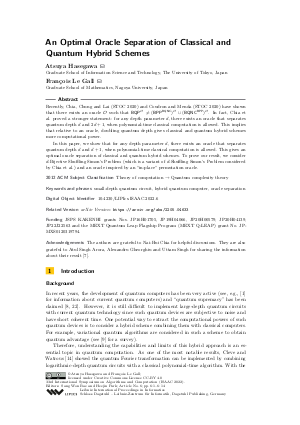@InProceedings{hasegawa_et_al:LIPIcs.ISAAC.2022.6,
author = {Hasegawa, Atsuya and Le Gall, Fran\c{c}ois},
title = {{An Optimal Oracle Separation of Classical and Quantum Hybrid Schemes}},
booktitle = {33rd International Symposium on Algorithms and Computation (ISAAC 2022)},
pages = {6:1--6:14},
series = {Leibniz International Proceedings in Informatics (LIPIcs)},
ISBN = {978-3-95977-258-7},
ISSN = {1868-8969},
year = {2022},
volume = {248},
editor = {Bae, Sang Won and Park, Heejin},
publisher = {Schloss Dagstuhl -- Leibniz-Zentrum f{\"u}r Informatik},
address = {Dagstuhl, Germany},
URL = {https://drops-dev.dagstuhl.de/entities/document/10.4230/LIPIcs.ISAAC.2022.6},
URN = {urn:nbn:de:0030-drops-172918},
doi = {10.4230/LIPIcs.ISAAC.2022.6},
annote = {Keywords: small-depth quantum circuit, hybrid quantum computer, oracle separation}
}

 Creative Commons Attribution 4.0 International license
Creative Commons Attribution 4.0 International license

